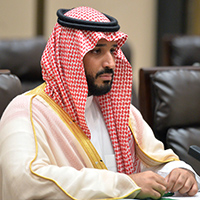UN investigators point to brazen cover-up in Khashoggi case
Emad Mekay, IBA Middle East Correspondent

Members of the United Nations team investigating the murder of Saudi journalist Jamal Khashoggi are speaking of a highly sophisticated cover-up operation by agents of the Saudi government undertaken with the approval of the Kingdom's powerful Crown Prince Mohammed bin Salman.
‘This wasn't just taking a scrubbing brush and a bottle of cleaning fluid. This was a very different level of cleaning and the destruction of particles and of DNA and of other material,’ says Baroness Helena Kennedy QC, a member of the UN team who visited Turkey in February and Director of the IBA's Human Rights Institute (IBAHRI), as she spoke of Saudi efforts to eradicate evidence at the scene of the Khashoggi murder. ‘This is about the destruction of evidence.’
You really do need to have a high level judicial inquiry with very senior judges from around the world who can take this to another level
Baroness Helena Kennedy QC, member of UN team investigating Khashoggi murder;
Director, IBAHRI
The investigation’s findings will be released to the UN Human Rights Council in June. Agnes Callamard, UN Rapporteur on Extrajudicial Killings, who headed the investigation team, will write the report and is expected to make a range of recommendations, including ‘for the purpose of a wider formal criminal accountability’.
In addition to Callamard and Kennedy, the team included Duarte Nuno Vieira, a forensics expert, and Paul Johnston, a homicide and major crimes police investigator, who looked at similar incidents in Northern Ireland.
Kennedy says the UN investigation team witnessed first-hand evidence shared by the Turkish police and intelligence agency.
They spoke to journalists who followed the case, met with the Turkish foreign minister, chief prosecutor and justice minister and interviewed Khashoggi's social contacts, friends and his fiancée who was waiting for him outside the Saudi consulate where he was killed while trying to get documents needed for their planned marriage.
‘We also heard the tapes of the key moments in the consulate and of other communications which added to the evidence, all of which points towards this having been a matter that was certainly orchestrated at the highest level,’ Kennedy tells Global Insight.

Baroness Helena Kennedy QC
‘How high is to be resolved but a very high level within the Kingdom of Saudi Arabia. People involved in it were intelligence officers at the highest level and a crack team came in,’ she continues.
Prominent Saudi journalist Jamal Khashoggi had criticised his government and new policies of its then new Crown Prince in a series of articles and social media posts that drew the ire of the ruling regime in the rich desert kingdom. After an international outcry, Riyadh said that rogue elements within its intelligence agencies carried out the killing and promised full cooperation with the investigation. But both international and Turkish investigators have said the Saudis were stonewalling and even trying to steer the investigation in their favour.
Kennedy tells Global Insight that Saudi endeavours to wipe out evidence raise questions about the involvement of more Saudi officials potentially at a much more senior level than suggested by Riyadh. ‘One of the things that did concern us is that after President Erdogan spoke to the Prince about events and commitment to collaboration in investigating what took place, the Turkish forensic teams of very high level investigative police were not allowed into that consulate for 13 days,’ she says. ‘In those 13 days serious cleaning operations took place including the painting of the premises before there was the admission of forensic teams to examine the scene of the crime. So there was an interference with the scene of crime for the destruction of evidence and that was after the prince himself had certainly been contacted. The question is why was that allowed to happen?’
Kennedy says that top Saudi officers were involved in the operation. ‘We do know that in the cleaning operation, two persons were involved certainly and engaged in that cleaning who were themselves scientific officers - highly qualified scientific officers from Saudi Arabia.’
Kennedy's statements come after news broke that the Saudi Crown Prince, who rose to power at the age of 30 in 2015, had sought to hunt and bring back or eliminate Saudi dissidents opposed to his new policies, including Khashoggi.
Saudi strategy
In response to the Khashoggi murder and international condemnation, the Saudi government sought to keep UN investigators at bay whilst adopting an aggressive approach.
At a meeting of the UN Human Rights Council in March, Bandar bin Mohammed al-Aiban, head of the Saudi Human Rights Commission, described the international probe as an interference in domestic policy and said that 11 individuals were already facing trial in the kingdom in connection with the murder. Al-Aiban said the Saudi judicial system has guarantees for a fair trial of the defendants and reported that 3 trials had already taken place.
When Interpol issued a red notice to locate and arrest 20 people believed to have been involved in the Khashoggi killing, Riyadh rejected the call.
Saudi Arabia also unleashed media attacks on Callamard saying the UN rapporteur had supported the Arab Spring, which saw public protests against entrenched ruling regimes, and was therefore ‘biased’. The Saudi-funded Al-Arabiya TV channel also ran a lengthy report quoting tweets by Callamard as proof of ‘anti-Saudi’ positions. Saudi media alleged Callamard favours Iranian groups, without naming them, as well as the Muslim Brotherhood, an accusation that is now a staple of Middle Eastern diplomacy that the region’s authoritarian regimes often resort to in order to intimidate critics of their rights records.

Saudi Crown Prince Mohammed bin Salman
Despite these efforts, the Saudis are likely to find it an uphill struggle. The CIA and a number of Western countries have already publicly said Crown Prince Mohammed bin Salman was behind the killing. His top aid Saud al-Qahtani, who also runs the prince’s PR machine and online promotion, is believed by Turkish authorities to have been in touch with the killers during the operation. Despite request for his arrest, Qahtani has been spotted in the UAE attending events.
‘The recent news that Saud al-Qahtani is not among the 11 facing trial also raises questions for the international legal community,’ says Sara Elizabeth Dill, Arab Regional Forum Liaison Officer with the IBA’s War Crimes Committee. ‘From a legal perspective, this case certainly highlights a number of difficulties the world faces when crimes are committed across multiple borders, and when government officials are involved. The nuances of diplomatic immunity should be revisited, as well as means of conducting multinational investigations.’
After her return, Callamard has not minced words about what she saw in Turkey either. ‘The murder of Mr Khashoggi was the result of an extrajudicial killing committed in a consulate office on foreign territory. Contrary to Saudi Arabia assertions, these are not internal, domestic matters. The rights of the victim and his family are at stake, but so too are the rights of other states under international treaties and law,’ Callamard says. ‘Evidence collected during my mission to Turkey shows prima facie case that Mr Khashoggi was the victim of a brutal and premeditated killing, planned and perpetrated by officials of the State of Saudi Arabia.’
Callamard urged Riyadh to make public both the names of all individuals under prosecution and the details of the charges they face over the Khashoggi killing. She says the Saudis need to share evidence against the accused, invite international and independent experts to monitor the trial proceedings and declare the fates of all those initially arrested in relation to the killing.
Callamard and her team were denied access to the Saudi consulate in Istanbul. ‘We were not allowed into the Saudi consulate. We asked the Saudis for access to the consulate. We didn't get it,’ Kennedy says, adding that their request to visit Saudi Arabia hasn't been answered either. The IBA has also asked to monitor the trial in Saudi Arabia but the call went unanswered.
The investigations by the Turkish authorities and international investigators are still bogged down in locating Khashoggi’s remains, something the Saudis have repeatedly refused to cooperate with.
‘This is not going to be the end of the road,’ Kennedy says. ‘This is the beginning of a process to see where this fell within the mandate and whether recommendations could be made to the Human Rights Council and to the Secretary General for a much bigger investigation. That's the question: should there be such an investigation?’
Kennedy tells Global Insight that under such circumstances an expanded international investigation would be preferred for real justice in the case. ‘I personally think that you really do need to have a high-level judicial inquiry with very senior judges from around the world who can take this to another level. Sometimes, [with] the whole business of justice you want it done and you want it done well, and you want as many people as possible recognising the seriousness of the situation. The next question is what happens for the next stage of the investigation and for overall adjudication by senior judges from around the world. That's what should happen.’
